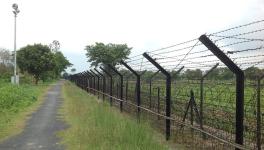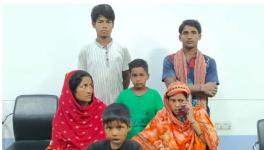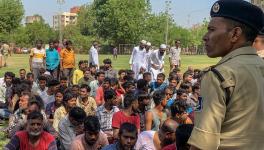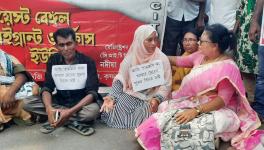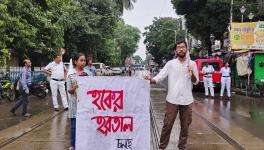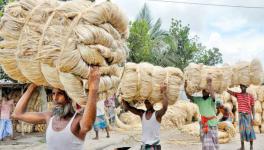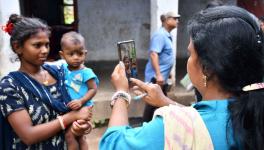Karnataka: Ridden Roughshod, Migrant Workers Unionise to Unitedly Voice their Rights
Bengaluru: Migrant workers across nation have remained one of the most vulnerable sections in India, more so amidst the deadly pandemic outbreak in 2020. Traversing through all challenges of existence, migrant workers in Karnataka have now unionised themselves to voice their needs more effectively. The union, named Inter State Migrant Workers’ Federation of Karnataka (IMFK), held its first ever conference here, attended by over 200 workers hailing from different states. The team from West Bengal was the largest in number.
The conference of IMFK, affiliated to the Centre of Indian Trade Unions (CITU), saw the presence of various trade union leaders, such as Hemalatha. K, national president, CITU, S.M. Sadi, president, Inter State Migrant Workers’ Union West Bengal, S. Varalakshmi, CITU Karnataka state president, H.N Gopal Gowda, CITU Karnataka vice-president, K.N Umesh, Dr. Prakash. K and Pratam Simha.
Recalling the migration horror during the pandemic-induced lockdown, Hemalatha said: “Starting from food to shelter to miles of walk back to homeland was an unforgivable assault by the (Narendra) Modi government during the country’s worst health emergency”.
She noted how despite limited resources, Karnataka CITU made took a lead in helping and rescuing workers in distress, which has now taken the shape of a union in a very short span of time. However, the real struggle is ahead as the threat of uncertainty looms over the lives of millions of migrant workers and their families.
“The state and Central government treated workers mercilessly,” she said, adding that there was now need to form new units of IMFK across the city.
Hemalatha was strongly critical of the non-implementation of the Interstate Migrant Workmen Act, 1979 (ISMW). The exodus of migrant workers in millions from urban areas could have been better managed, had the ISMW Act 1979 been implemented in its entirety, both by the state and the Central government, she added.
The ISMW Act 1979 was enacted to regulate the condition of service of interstate labourers. The Act’s purpose is to protect workers whose services are requisitioned outside their native states in India.
As per a report provided by the Labour Department of Karnataka on workplace accidents in the state, there are 65.45 lakh inter-state migrant workers in the state.
Addressing the conference, S.M Sadi, former CPI (M) MLA in West Bengal and president of the Inter State Workers’ Union West Bengal, pointed out that “every worker aspires to have a decent livelihood, food, shelter and security, but after 70 years of Independence, their aspiration seem to be getting crushed everyday by those ruling the country and the state”.
Elaborating on the “anti-worker” decisions of governments, Sadi said: “Modi and Mamata (West Bengal chief minister Mamata Banerjee) did not think even a bit for workers while handling the pandemic. Prime Minister Narendra Modi gave only four hours’ notice for the lockdown to millions of workers that led to panic, while Banerjee termed the worker- laden train as “Corona Express”.”
He hailed the migrant workers, who, despite the crisis, for having fought to unionise themselves, as reflected in the IMFK. The veteran leader from West Bengal lauded the efforts of CITU Karnataka for undertaking COVID relief work among migrants, such as providing them free ration kits, a helpline number for distressed workers and logistics to board trains and buses to go back to their respective states.
H.N Gopal Gowda, CITU state vice president, detailed the efforts of IMFK in terms of the health sector. The foundation stone for a free health clinic, called Shramik Clinic, with facilities like discounted medicines and diagnostic facilities for unorganised workers was laid on February 13 this year. The Shramik Clinic is an extended campaign undertaken by CITU during the second COVID wave with initiatives like free online medical consultation, free counselling, free oxygen service centre and medicine kits.
Abdul Samad Sheikh (45), a migrant worker from Nadia district of West Bengal earns his livelihood in Bangalore by washing cars. Speaking to NewsClick he said IMFK had emerged as a life saviour in harrowing time of the pandemic. Moreover, our voices for health, education and financial assistance have got emboldened after mobilising under the banner of IMFK.
Abdul Samad is one of the office-bearers of the executive committee of IMFK. The 16-member executive committee is headed by H.N. Gopal Gowda as honorary president, Muniraju as president, Dhiman Sau as secretary, Suman Das as organising secretary, apart from four vice-presidents and a treasurer.
At present, there are 13 units of the union in Bangalore, of which four are women-led committees. This has ushered confidence among women workers to head on challenges. Shamim (40), a Brookfield-based slum worker and a member of the women’s committee is one of them. Addressing her fellow workers, she echoed the demand of subsidised health and education facilities by the government.
Shamim fears that the young generation may slip into illiteracy which would become a lifetime curse, but at the same time reposed hope in the formation of IMFK as a rescuer of the struggling and deprived masses in a cosmopolitan city.
Also Read: COVID-19: Distressed Migrant Workers Protest in Bangalore, Demand Relief
IMFK Background
The precursor movement that led to the formation of a dedicated union of migrant workers was forcible eviction of thousands of workers and family from slums in 2018. Workers across city live in slum hamlets and pay a rent of Rs. 2,000 on land encroached by locals involved in real estate. They are threatened and abused on regular basis if the rent is delayed and sometimes even evicted. In 2018, the BJP MLA representing the Mahadevpura constituency created an uproar labeling migrant workers as “Bangladeshi infiltrators”, enforced municipal officials to snap water and electricity supply to slum dwellers against which workers staged a peaceful protest showcasing their voter and Aadhar cards and displaying a tricolour at the protest site.
The intervention by CITU then safeguarded the migrants workers from Bengal who were being branded as “infiltrators, Bangladeshis” by local BJP and Sangha Parivar leaders in nexus with the local administration. The CITU enabled activists in mass mobilization and helped them in dealing with day to day insecurities of education, health and social security. CITU volunteers were engaged to teach slum kids, shield women workers and rag pickers from local threats.
It was the relief work by CITU during the first and second pandemic waves that compelled Labour Department of Karnataka to distribute free cooked food in all 198 wards of Bruhat Bangalore Mahanagara Palike (BBMP). The most striking contribution by IMFK was persuading the State Labour Department to provide 1,916 free ration kits and 2,077 safety kits across the city. This helped in cementing the TU’s efforts in winning over the confidence of the urban poor working class – which has eventually taken shape of the first union of migrant workers in the state.
The writer is a freelance journalist.
Get the latest reports & analysis with people's perspective on Protests, movements & deep analytical videos, discussions of the current affairs in your Telegram app. Subscribe to NewsClick's Telegram channel & get Real-Time updates on stories, as they get published on our website.










